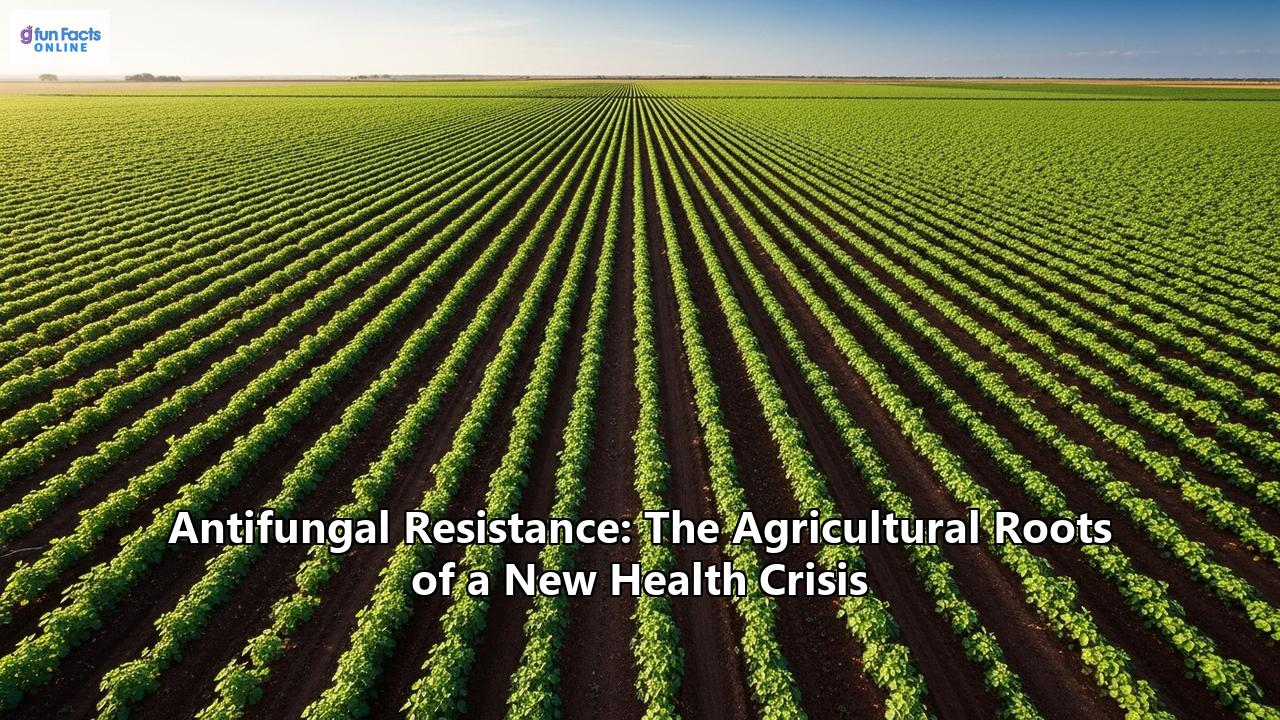A silent threat is rising from our fields and farms, one that could plunge modern medicine into a new crisis. The very fungicides used to protect our crops are inadvertently breeding a new generation of drug-resistant fungi, posing a significant and growing danger to human health. This isn't a scene from a dystopian novel; it's a real-world problem unfolding across the globe, with potentially devastating consequences.
The Unseen Enemy: Aspergillus fumigatus
At the heart of this crisis is a common mold called Aspergillus fumigatus. Found in soil, decaying organic matter, and the air we breathe, this fungus is generally harmless to healthy individuals. However, for those with weakened immune systems, such as cancer patients, organ transplant recipients, and the elderly, an Aspergillus infection, known as aspergillosis, can be life-threatening.
The primary line of defense against aspergillosis and other serious fungal infections is a class of drugs called azoles. These medications are crucial for treating invasive fungal diseases, but their effectiveness is increasingly being compromised. The reason? The widespread use of chemically similar azole-based fungicides in agriculture.
The Agricultural Connection: A Breeding Ground for Resistance
To safeguard crops from fungal diseases and ensure global food security, farmers rely heavily on fungicides. The global market for these chemicals is massive, with their use forecasted to intensify. In the European Union alone, approximately 120,000 tonnes of azoles are sold annually for non-medical purposes, predominantly in agriculture. This extensive application creates an environment where Aspergillus fumigatus is constantly exposed to azoles.
This constant exposure acts as a powerful evolutionary pressure. While the fungicides kill off susceptible fungi, the naturally resistant strains survive, multiply, and spread. The result is the emergence of azole-resistant Aspergillus fumigatus in the environment, which can then infect humans. This is not a case of drug-resistant bacteria spreading from person to person; the transmission is happening from the environment to people.
The Science Behind the Threat
The link between agricultural fungicide use and clinical antifungal resistance is not just a hypothesis; it's backed by substantial scientific evidence. Researchers have found that the molecular mechanisms of resistance in Aspergillus fumigatus from patients who have never been treated with azole antifungals are identical to those found in resistant strains from the agricultural environment.
A study by the University of Georgia provided clear evidence by finding that Aspergillus fumigatus strains resistant to agricultural fungicides were also resistant to the azoles used in a clinical setting. Tellingly, these resistant strains from patients also carried genetic markers indicating exposure to other classes of fungicides used exclusively in agriculture.
This cross-resistance is the crux of the problem. The fungicides used on our crops are so similar to the life-saving antifungal drugs used in hospitals that resistance to one often means resistance to the other.
A Global Problem with Deadly Consequences
The rise of antifungal resistance is a global phenomenon. Before the year 2000, resistant isolates of Aspergillus were virtually nonexistent; now, they have been documented on every continent except Antarctica. The prevalence of azole-resistant Aspergillus fumigatus infections varies by region but can be alarmingly high, with some areas in Southeast Asia reporting resistance rates of up to 92%.
The consequences for patients infected with these resistant strains are dire. The mortality rate for invasive aspergillosis is already high, but for patients with a resistant infection, it can reach as high as 100%. The limited number of available antifungal drug classes means that when azoles fail, there are very few, if any, alternative treatment options.
Hotspots and High-Risk Environments
Certain environments act as hotspots for the development and spread of resistant fungi. Compost, in particular, has been identified as a significant breeding ground for azole-resistant Aspergillus fumigatus. The stockpiling of agricultural waste and its use as a soil amendment are also major contributors to the problem. Individuals with compromised immune systems are advised to be cautious around these areas.
Broader Implications and a Call to Action
The issue of antifungal resistance highlights the interconnectedness of human, animal, and environmental health—a concept known as "One Health." The widespread use of antimicrobial agents in one sector can have unintended and dangerous consequences in another. This mirrors the lessons learned from the overuse of antibiotics in livestock, which has contributed to the rise of antibiotic-resistant bacteria.
Addressing this looming health crisis requires a multi-pronged, global effort:
- Stricter Regulations: There is a pressing need for coordinated global regulation of fungicides to slow the development of resistance. This includes a thorough assessment of the potential impacts of new agricultural pesticides on human and animal health before they are approved for large-scale use.
- Alternative Agricultural Practices: A shift towards more sustainable and ecological farming practices could reduce the reliance on chemical fungicides. Discontinuing the use of agricultural azoles, as is done on organic farms, appears to be the most effective way to reduce the selection pressure for resistance.
- Research and Development: Investment in the development of new antifungal drugs with novel mechanisms of action is crucial. However, the emergence of resistance to a new class of antifungals even before its clinical deployment, due to a newly approved agricultural fungicide with the same target, underscores the urgency of a coordinated approach.
- Surveillance and Monitoring: Enhanced surveillance of antifungal resistance in both clinical and agricultural settings is necessary to track the spread of resistant strains and inform public health interventions.
The silent creep of antifungal resistance from our fields to our hospitals is a stark reminder of the delicate balance within our ecosystem. The choices we make in agriculture have a direct and profound impact on human health. Without a concerted and immediate global response, we risk losing our most effective tools against life-threatening fungal infections, ushering in a new and dangerous chapter in the story of antimicrobial resistance.
Reference:
- https://news.uga.edu/agricultural-fungicides-may-be-driving-resistance/
- https://www.centerforfoodsafety.org/issues/6459/pesticides/fungicides
- https://beyondpesticides.org/dailynewsblog/2022/02/deadly-fungus-resistant-to-fungicide-jumps-from-farms-to-people-as-human-pathogen-spreads/
- https://www.manchester.ac.uk/about/news/crop-spray-could-lead-to-mass-resistance-in-new-generation-antifungal-treatments/
- https://genestogenomes.org/for-this-human-pathogen-agriculture-may-be-a-source-of-antifungal-resistance/
- https://www.contagionlive.com/view/azole-fungicides-in-agriculture-linked-to-rising-resistance-in-aspergillus-fumigatus
- https://www.longdom.org/open-access/impact-of-fungicide-pesticides-on-human-and-environment-84680.html
- https://journals.asm.org/doi/10.1128/mbio.02213-20
- https://www.cdc.gov/aspergillosis/php/guidance/azole-resistant-aspergillus.html
- https://www.cdc.gov/fungal/antimicrobial-resistant-fungi/index.html
- https://gaffi.org/climbing-antifungal-drug-resistance-in-south-east-asia-worrying/
- https://www.ema.europa.eu/en/news/one-health-eu-agencies-unite-tackle-azole-fungicide-resistance-aspergillus-fungi
- https://health.ucdavis.edu/news/headlines/infectious-diseases-experts-raise-alarm-about-antifungal-resistance-call-for-global-effort-/2025/06

